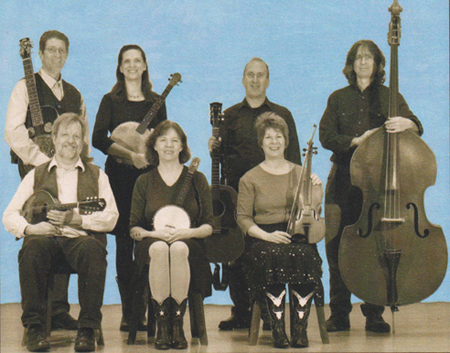100 years ago, April 19 was a Saturday, and in Chicago it was the first of a long string of Saturday nights that featured a live broadcast of the National Barn Dance on WLS radio. The early National Barn Dance (or NBD) was a four-hour variety program that gained wide popularity in both the farm districts of the Midwest and among city dwellers in Chicago and elsewhere in the region.
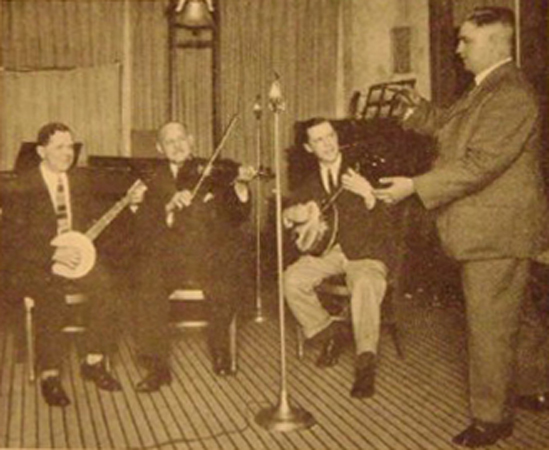
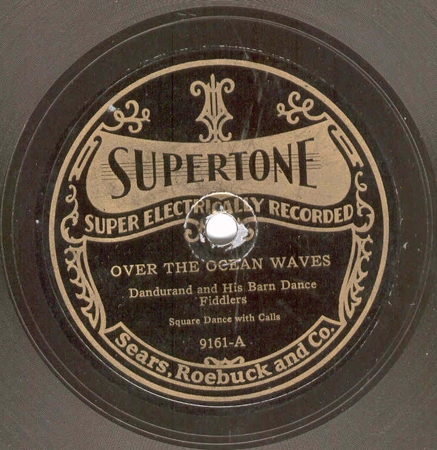
The variety format was evident from the very first Barn Dance broadcast. On 4/19/1924, an unknown fiddler using the pseudonym “Timothy Cornrow from Ioway,” played old-time square dance tunes, alternating with sets by Isham Jones’ College Inn Orchestra playing popular tunes of the day. Throughout its entire 36-year run, the NBD paired popular artists–described as “trained” or “educated” musicians–and folk musicians–those who “knew what real work was” (most often farm work). The folksy flavor, however, dominated the entire presentation. The entire cast was referred to as “the Hayloft Gang.”
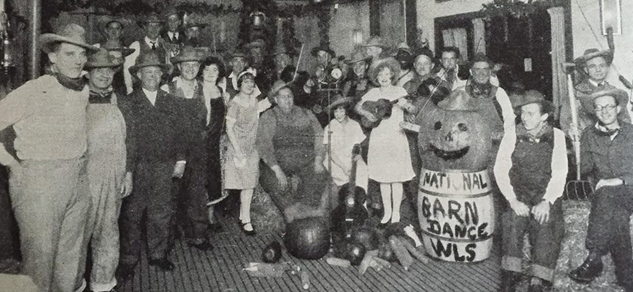
The NBD reached an incredible peak of popularity in the 1930s, making Chicago the capital of country music for that decade. Besides the 5 and 1/2 hour-long broadcast on Saturday nights, the NBD cast performed at other WLS shows throughout the week and kept up a busy schedule of personal appearances throughout the listening area. A further sign of the show’s repute was the 25-year run of 2 sold-out live performances every Saturday night at the Eighth Street Theatre. Many stories are told of rural Midwesterners making the trek to Chicago and lining up outside the theater early in the day on Saturday. They came to see the National Barn Dance, not Chicago’s many other sights.
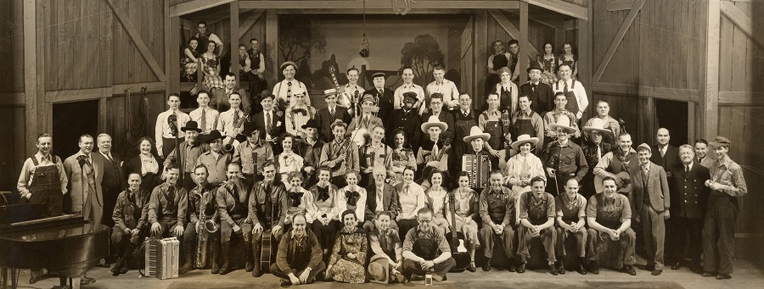
Its days of popular fame long over, the NBD is mostly forgotten today, its story untold. Some years back, I did my part to tell that story. While I was digging around in archives and libraries in order to write a history of traditional fiddling in the Midwest, I became increasingly intrigued by the regional folk artists who found some measure of fame in Chicago. Ultimately, I worked as music supervisor for a Corporation for Public Broadcasting independent documentary film The Hayloft Gang: The Story of the National Barn Dance, produced by Stephen Parry. I also wrote the lead essay, The Rise of Rural Rhythm, for a companion book edited by Chad Berry and published by the University of Illinois Press in 2008.
Big announcement! That article is now posted in full on drdosido.net for all to read. (Look under the Stories menu.) As it was rather lengthy, I posted it in two parts. You can find it here:
“The Rise of Rural Rhythm,” pp. 17-71 in The Hayloft Gang: The Story of the National Barn Dance. Edited by Chad Berry. University of Illinois Press, 2008.
In both parts I have linked dozens of recordings to the text so that the curious reader can hear the sounds of the National Barn Dance while learning about the important place it once held in Chicago and in the history American vernacular music.
Before I began my rewarding partnership with documentarian Stephen Parry, I had a chance to do a NBD Tribute concert at the Old Town School of Folk Music in Chicago. In 2003, Colleen Miller, the School’s concert director asked me to put together an opening act of old-time music for an appearance by a touring band from Kentucky, the Reeltime Travelers. I brought together several friends, including two Volo Bogtrotter bandmates, and we tried out some favorite old-time songs with a bit of playacting.
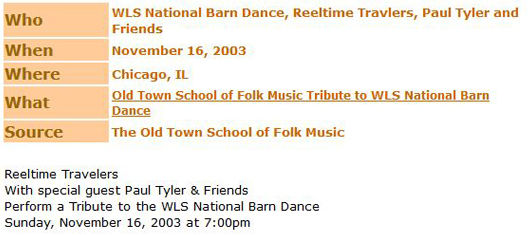
Because the Old Town School’s press release for this concert caught the attention of the webmaster at Hillbilly-Music.com, that November night in 2003 included a very memorable and serendipitous event. The daughter and widow of early NBD star Karl Davis, of Karl & Harty and the Cumberland Ridge Runners, made the drive down from Madison, Wisconsin to attend the Tribute. I got to talk to them after the show, and was delighted by the daughter’s story of being a kid sitting on the hay bales at the front of the stage during live shows at the Eighth Street Theatre in the late 1930s or early ’40s. Around the same time, I taught a Karl & Harty classic (heard below) to my Early Country Ensemble class at the Old Town School of Folk Music. I had a beloved friend and fellow teacher in that class, Ted Johnson, who told me he remembered hearing Karl & Harty sing that very song on a live broadcast when he was a kid. We did the math. Ted may have been listening in on the same night that Karl’s daughter was sitting on the stage.
Our entire Tribute concert from 2003, including our role-playing silliness, is linked below. The Tribute cast included Fred Campeau on banjo, steel guitar & fiddle; Paul Tyler on guitar, fiddle & mandolin; and Jordan Wankoff on guitar and fiddle. Along with Michelle “Mitch” Thomas and Gail Tyler, all provided vocals. Fred and Steve Rosen shared the emcee duties. The Tribute included a slide show of pictures of the artists we were portraying. For comparison’s sake, a parallel posting of this same set list with recordings by the original artists can be found on drdosido.net‘s Old 78s pages.
1. Preface – Paul Tyler
2. Beau of Oak Hill – Paul, Jordan, & Fred as WLS Barn Dance Fiddlers
3. Roll Along, Prairie Moon – Mitch & Gail as the Girls of the Golden West
4. I Am a Texas Cowboy – Paul as Arkansas Woodchopper
5. Montana Plains – Gail as Patsy Montana
6. Hell on the Wabash/Get Aboard the Ship – Paul, Jordan, & Fred as Tom Owens Barn Dance Trio/Slim Miller w/ the Cumberland Ridge Runners
7. I’m Here to Get My Baby Out of Jail – Paul & Jordan as Karl & Harty
8. I Left Her Standing There – Mitch & Gail as the Dezurik Sisters
9. Farming by the Fire – Paul as Pie Plant Pete
10. Kansas City Rag – Jordan, Paul & Fred as the Prairie Ramblers
11. Jim’s Windy Mule – Paul & Fred as the Prairie Ramblers
12. Intoduction of cast – Paul Tyler
13. That Crazy War – cast as Lulu Belle & Scotty
One further note of interest. After our NBD Tribute show, most of the cast, with two additions, worked together for a time as the WAZO County Warblers with the Fly Boys: “Old-Time music with the zing of swing.” It’s about time we put our CD up on BandCamp. Stay tuned.
